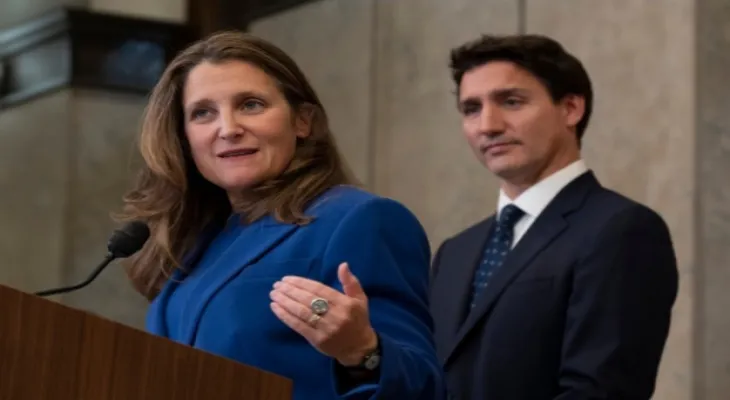Search here
Newspaper
Search here

Arab Canada News
News

Published: November 2, 2022
Finance Minister Chrystia Freeland is scheduled to present the government's economic forecasts and spending plans in the economic fall statement on Thursday as inflation, rising interest rates, and growing recession buzz continue. While Freeland promised to share financial forecasts "with some precision," experts who spoke to Global News expect the government to "hedge" its bets and avoid major spending commitments heading into uncertain economic times. The government's actual deficit for the 2021-22 fiscal year also improved significantly from federal expectations. In the spring budget, the federal government had projected a deficit of $113.8 billion for the past fiscal year, but the actual numbers from the Canadian Public Accounts released last week came in at $90.2 billion. Similarly, Desjardins expects the federal deficit to continue shrinking to $20.6 billion for the 2022-23 period—much lower than Ottawa’s forecast of $52.8 billion in the 2022 budget. The Parliamentary Budget Office recently forecasted a deficit reduction of $25.8 billion. Bartlett also says that while part of the improved picture is due to lower government spending, a significant boost is due to higher tax revenues, since inflation raises the cost of goods, the government earns more in taxes as part of those sales. Furthermore, with Canada's tight labor market, workers have also pushed employers to raise wages to offset rising living costs. This also fuels government revenues through increased income tax receipts. But Bartlett warns that inflation is not necessarily a cure-all for the government deficit, adding: "What inflation gives, it ultimately takes away."
While the Bank of Canada moves to fight inflation, it raises interest rates to increase borrowing costs and take the steam out of the economy. Bartlett says this will eventually become a drain on government finances, not a boost, with rising unemployment rates and more Canadians shifting from paying federal income tax to relying on programs like employment insurance. Likewise, Canadians are not alone in dealing with the impact of rising interest rates—the federal government must also factor in higher borrowing costs in its forecasts, notes Moshe Lander, Professor of Economics at Concordia University in Montreal. With "huge debts" on the books, Lander says the federal government will have to renew its loans at the higher rates today. Putting this together, the coming months could see federal revenues contract and a shift toward paying interest more than principal on debts—a situation that many homeowners renewing their mortgages may find familiar as inflation strains their budgets and interest rates rise to their highest levels in more than a decade. Additionally, while Desjardins expects a smaller-than-expected deficit this fiscal year, it calls for a return to rising deficits in upcoming budgets as the government faces higher spending program demands amid a possible recession.
Desjardins is among those forecasting a recession in 2023. But Bartlett says he sees Freeland laying out three possible scenarios in the document. Lander similarly says he believes the federal government will "hedge" its bets on a possible recession, but he adds that the Liberals will likely be wise to do so rather than inadvertently tipping the economic scales toward contraction. "You never want to say a recession is coming. That in itself can become a self-fulfilling prophecy," Lander says, adding that careful readers of the economic fall statement should instead look for "softened phrases" about a "slowdown in growth in 2023" to analyze federal concerns about looming hardships.
With expectations that the federal government will keep its economic forecasts close to the vest, experts also say there is likely to be little announcement of new measures to support Canadians before a possible recession. Citing two senior government sources, Reuters reported last week that Ottawa’s update might include some targeted spending but will avoid measures that could increase inflation and consumer demand. A senior source familiar with the draft told Reuters they expected the document to "chart a responsible course, investing in targeted ways in Canadians while retaining fiscal firepower to face any challenges that might arise worldwide." Additionally, Lander says the government could offer a framework acknowledging "difficult economic times ahead" and delaying any large spending plans until the full federal spring budget. By then, the government will have a clearer picture of how the Bank of Canada’s interest rate hikes are slowing the economy and where gaps need support, he says.
Otherwise, the government is likely to "play" with already announced programs—doubling the Goods and Services Tax credit and introducing the dental care bill in the House of Commons—instead of announcing new spending. Both Bartlett and Lander say the government will face a tough task in this fiscal update to calm fears that it is not doing enough to support Canadians and to avoid contributing to inflationary pressures.
Speaking before a Senate committee on Tuesday, Carolyn Rogers, Senior Deputy Governor of the Bank of Canada, mentioned supply chains as an area where Ottawa could invest to offset the impact of inflation without working against central bank efforts. But she clarified, along with Governor Tiff Macklem, that while federal spending plans can complement their efforts, government policy cannot reduce the need for more interest rate hikes in the future.
Comments